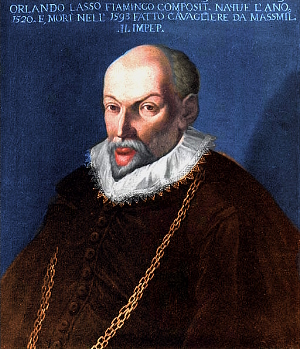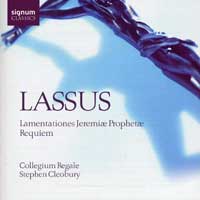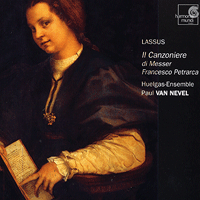In Celebration of the Human Voice - The Essential Musical Instrument
Home | Doo Wop | Barbershop | World | Contemporary | Christian | Vocal Jazz | Choral | Christmas | Instructional | Arrangements
Classical | Opera | Musicals | Personality | Young Singers | Disney | Videos | Songs | The Artists

Orlando Lassus

Orlando di Lasso was born in Mons in the province of Hainaut, in what is today Belgium. Information about his early years is scanty, although some uncorroborated stories have survived, the most famous of which is that he was kidnapped three times because of the singular beauty of his singing voice. At the age of 12 he left the Low Countries with Ferrante Gonzaga and went to Mantua, Sicily, and later Milan (from 1547 to 1549). While in Milan he made the acquaintance of the madrigalist Hoste da Reggio, an influence which was formative on his early musical style. He then worked as a singer and a composer for Constantino Castrioto in Naples in the early 1550s, and his first works are presumed to date from this time. Next he moved to Rome, where he worked for the Archduke of Florence, who maintained a household there; and in 1553, he became maestro di cappella (chorus leader) of the Basilica di San Giovanni in Laterano in Rome, a spectacularly prestigious post for a man only 21 years old, but he stayed there only for a year (Palestrina took this post a year later, in 1555). |
Arrangements | Recordings
Recordings and DVDs
Displaying 1-2 of 2 items.
Collegium Regale : Lassus  During the last thirty years of his life, Orlande De Lassus was the most celebrated composer in Europe. From the time that he took up the duties of maestro di cappella in the court of the Dukes of Bavaria at Munich, he began to be called 'prince of musicians' and 'the divine Orlande'. The pieces selected for this recording represent Lassus's treatment of them of death during the mature period. The first group considers the death of Christ; the second, the death of a Christian. Stephen Cleobury is associated with two of the most famous choirs; as Director of Music at King's College, Cambridge and Chief Conductor of the BBC Singers. Songlist: Lamentatio Prima, Lamentatio Secunda, Lamtatio Tertia, Motet: In Monte Oliveti, Tract: Absolve, Domine, Introitus: Requiem Aeternam, Kyrie Eleison, Gradule: Si Ambulem, Offertoriu: Domine Jesu Christe, Sanctus, Agnus Dei, Communio: Lux Aeterna, Motet: Vide Homo Huelgas Ensemble : Lassus It was in seeking to set to music the emotions they found in literary texts and poems - imitar le parole - that the madrigalists of the early sixteenth century rediscovered the poetry of Francesco Petrarca. The rich imagery of his language provided the springboard for Orlande de Lassus, in particular, to show his mastery over a period of nearly forty years as one of the greatest composers of madrigals. Songlist: Solo e pensoso, S'una fede amorosa, Di pensier in pensier, Tutto'l di piango, Cantai, hor piango, Che fai, alma?, La ver' l'aurora, Mia benigna fortuna, Io son si stanco sotto, I'vo piangendo |
![]() Vocal Harmony Arrangements - Home
Vocal Harmony Arrangements - Home
Christian | Gospel | Standards | Musicals | Specialty | World | Barbershop | Contemporary | Vocal Jazz | Choral | Christmas
Mixed Voices | Female | Male | 8 Parts | 6 Parts | 5 Parts | 3 Parts | 2 Parts | Medleys | Solo | Folio Series | New Releases
Select a Category |
Want to Sing? - Find a Chorus Near You
List of Choruses by State | List of Choruses by City


